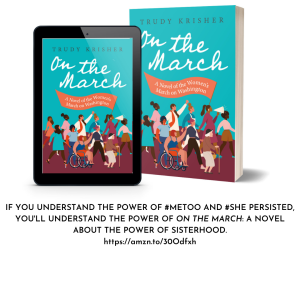On January 21, 2017, thousands of women descended on the nation’s capital, arriving by plane, by bus, by car, by motorcycle, by skateboard, by foot. They were wearing sneakers and sandals, Crocs and Doc Martens, Army boots and orthopedic shoes. They carried backpacks and fanny packs, cell phones and water bottles, even babies in slings. They had heard a newly inaugurated President proclaim that he could grab women by the genitals, insult their face and weight, and stalk a respected Presidential opponent from a debate stage, disparaging her as a “nasty woman” in front of the entire country.
They were mad as hell, and they weren’t going to take it anymore.
“I am woman,” they shouted. “Hear me roar.”
And roar they did.
THE ROAR
-The crowd began to roar. The roaring came in a rolling wave, gathering at the far edges of the crowd and then sweeping to the front. It was a tsunami gathering force deep in the ocean of history and then plunging across the world, its beaches, its cities, its farmlands, its mountains, sweeping the entire globe. It felt like church. Like something sacred, transcendent, holy. Decades of silence had been given a voice. – from ON THE MARCH: A NOVEL OF THE WOMEN’S MARCH ON WASHINGTON
I could never have written about that roar – or understood its power – until after I had attended the 2017 Women’s March on Washington. It was an event that deepened my understanding, expanded my creativity, and changed my life.
Women are said to be shy about revealing their age: Not Me! I was proud to have hauled my 70-year-old self onto a bus outside a Wal-Mart in Dayton, Ohio for the 17-hour round trip to Washington, D.C. I was proudly wearing a sturdy pair of sneakers (my knees!) and proactively wearing a pair of Depends (my bladder!), thankful for the balmy winter weather that didn’t require a heavy coat (my shoulders!).
Throughout the experience, I heard hundreds of women cheer, shout, and exclaim: “I’ve Never Done Anything Like This Before!”
#MeToo!
 A group of marchers from Dayton, OH pose for the camera with the Capitol in the distance
A group of marchers from Dayton, OH pose for the camera with the Capitol in the distance
Still, I’d never walked a picket line, stood on a corner waving a sign, or protested on behalf of anything before. That didn’t mean I didn’t share deep sympathies with those who did. But I was a writer, one of those creatives whose noisemakers were the clickety-clacks and tappity-taps on the keyboard of a computer. The writer in me had always been an observer, someone whose nature was to notice, to perceive, to witness. After all, those observations gave me the novels I had published. Social justice themes were being waved from all their covers – I had just never held up a banner on a street corner before.
As a result, I was an unlikely participant in the Women’s March on Washington.
But after the election of 2016, I was heartsick: at the age of 70, I would likely die before I’d see a woman elected President of the United States.
So, like thousands of other women who were also heartsick, I decided to march.
The march transformed us. After January 21, 2017, other women ran for office, launched non-profits, and raised their voices like never before. I decided to write a new novel. This year, on the 5th anniversary of The March, ON THE MARCH: A NOVEL OF THE WOMEN’S MARCH ON WASHINGTON, is being released. Writing it has been my extended kind of roar.

THE STENCH
But the energy generated by the roar is under attack. Not by missiles or tanks. But by a stench.
A stench is different from its cousins, the stink and the fume. A stench is more than the momentary stink of a dirty diaper or the passing of gas. It spews longer than the fleeting fumes from a fleeing skunk or the escaping exhaust from an 18-wheeler. After all, a stink may be temporary, fumes may be dispersed, but a stench permeates. It floods our nostrils. It leaches into our lungs. It is longstanding and inescapable. The women who produced the roar that became a wave now know that something continues to stink to high heaven, something that has sunk deep into the pores of the body politic. The roar has become a stench.
Nobody can detect a stench better than a woman. At home, their lives revolve around scrubbing toilets and emptying litter boxes. They potty train the toddler and clean up after the hurling dog. They know when the eggs in the refrigerator have reached their expiration date or when the milk is starting to sour. They live with things that make you go eewwww.
At work, women also know when things stink to high heaven. When a veteran thinks the prosthetist who makes his artificial knee must also tolerate his advances. When a female Teacher-of-the-Year is replaced by a man who can coach basketball. When women become pillars of a church that ignores their leadership.
But women are also good at detecting stenches in the body politic.
They’ve been catching whiffs of that kind of stench for decades. After all, the Equal Rights Amendment, written in 1923, fell three states short of ratification in 1982. Dead after a long terminal illness, decomposing ever since.
Women know that the body politic stinks when a Presidential candidate can be called a “nasty woman.” Or when a Presidential office seeker says he can grab women by their private parts. Or when “lock her up” becomes the mantra du jour. As women lifted their heads and sniffed the air in 2017, they recognized the miasma that was suffocating them. Something, they realized, was rotten in the state of America.
So they marched. They roared. They persisted.
And then came Texas.
Empowered by The March that promised some gulps of fresh air, we women were soon sniffing out the new stenchy cloud. White men in the state of Texas passed laws reminding us that we could no longer claim our bodies as our own. Without equal representation in their Congress, they declared that our bodies must bear the children that their bodies had impregnated. Even if by rape or incest. They decided that our neighbors could be weaponized against us, serving as secret police, wreaking vigilante justice that imposed back-breaking fines for the slightest transgression. And the United States Supreme Court stood by. Not even holding their noses.
Except for one.
That one had sniffed the political air and found it deadly. Like a bloodhound, she had run it to ground, naming it for what it was: a stench. Justice Sonia Sotomayor raised a question that not just rivaled but surpassed the twisted tenets of a petty president. “Will this institution,” she asked, “survive the stench… in the public perception that the Constitution and its reading are just political acts?”
Like Isaiah from the Old Testament, whose prophecies were confirmed by the writers of the future Gospels, Justice Sotomayor’s words were not just a question: they were an invitation.
The Justice had issued a call-to-arms for the women of America. Once again, we would have to demand our brethren, the ones in the pick-up trucks, in the executive suites, and in the black robes, to take their feet off our necks.
And now we have the leaked draft of Justice Samuel Alito’s decision emphatically ending Roe v. Wade. It is shocking, but not surprising. The Republican Right has been planning for this for years, manipulating the legislative, the executive, and now the judicial system to work its will, not the people’s.
Across the decades, we women have had to learn to fight back. If we want the vote. If we want equal pay. If we want control of our own bodies. We will have to throw off the gingham aprons and stiletto heels and don our Rose the Riveter kerchiefs and pussyhats again. We will have to re-learn the truism that “Asking Doesn’t Work.”
Yes, Justice Sotomayor. We accept your invitation of your question. We must roar and roar and roar again. In the streets. In the courts. At the voting booth. And our rallying cry will not be “Stop the Steal,” but “Stop the Stench.”
##
Trudy Krisher is an award-winning writer from Ohio. Her latest novel is ON THE MARCH: A NOVEL OF THE WOMEN’S MARCH ON WASHINGTON (available from Amazon and Ingram). You can learn more about her at her website: https://www.trudykrisher.com or at Facebook (trudykrisherauthor.com).
